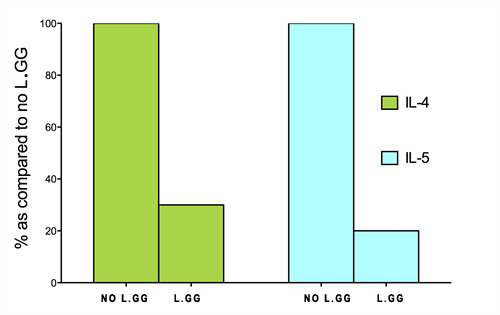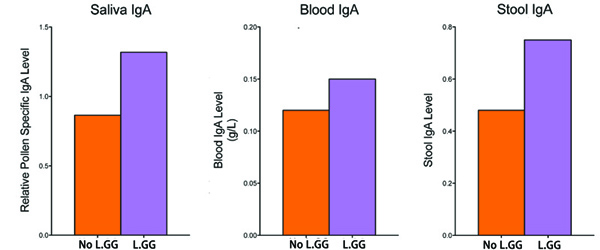Allergy manifests in many ways, such as skin, food, nose or lung allergies.
Research provides evidence that LACTOGG®’s probiotic strain is beneficial in:
● atopic eczema (skin allergy)
● cow milk allergy (food allergy)
● allergic rhinitis (allergic nose)
● bronchial asthma
Allergy is a form of immune deviation.
Allergy occurs when the immune system recognises substances normally found in our environment (eg. pollen or food component) as being harmful. When our immune system “mistakenly” identifies a substance as harmful, it launches a series of immune responses, resulting in inflammation. Very often it is the uncontrolled inflammatory reaction initiated by the immune system which gives rise to the symptoms of allergy and which injures our body.
Once someone becomes allergic, it is extremely difficult to “re-set” his or her immune system and make him or her non-allergic again.
GG probiotic has beneficial effects on allergy mainly because it can communicate with the immune system, gradually influencing it away from manifesting “allergic” behaviour to showing more “tolerance”.
It has numerous scientific papers documenting its ability to regulate and readjust the immune system so that the intensity of inflammation is reduced, protecting our body from being harmed.
Immune modification can be seen in the blood of allergic persons before and after taking the probiotic strain. Immune factors which promote allergy are suppressed when GG probiotic is introduced.

% drop in blood levels of allergic immune factors (IL-4 and IL-5) in allergic patients after taking Lactobacillus GG [Kawase et al. 2009]
At the same time, antibodies called IgA, which protect people from developing allergy, are stimulated after consuming GG probiotic.

Change in specific IgA levels in adults with birch pollen allergy, infants with allergic eczema and infants with cow milk allergy after consuming Lactobacillus GG. [Piirainen et al. 2008, Marschan et al. 2008]
How should LACTOGG® be taken?
Anyone allergic:
At least 1 sachet or 1 capsule a day
Since LACTOGG® works by influencing the immune system, it should be taken daily for at least 6 weeks in order for the immune system to become less allergic.
Medication prescribed by your doctor should not be suddenly abandoned but should be continued according to your doctor’s instructions. In atopic eczema, improvement is noted when there is gradually less need for medication or when the interval between flare-ups gets longer.
Once LACTOGG®’s beneficial effects are evident, your doctor may consider reducing your allergy medication, while you continue taking LACTOGG®.
References:
Kawase M et al. Effect of fermented milk prepared with two probiotic strains on Japanese cedar pollinosis in a double-blind placebo-controlled clinical study. Int J Food Microbiol 2009;128(3):429-434
Marschan E et al. Probiotics in infancy induce protective immune profiles that are characteristic for chronic low-grade inflammation. Clin Exp Allergy 2008;38:611-618
Pelto L et al. Probiotic bacteria down-regulate the milk-induced inflammatory response in milk-hypersensitive subjects but have an immmunostimulatory effect in healthy subjects. Clin Exp Allergy 1998;28:1474-1479
Piirainen L et al.Effect of Lactobacillus rhamnosus GG on rBet v1 and rMal d1 specific IgA in the saliva of patients with birch pollen allergy. Ann Allergy Asthma Immunol 2008;100(4):338-342


